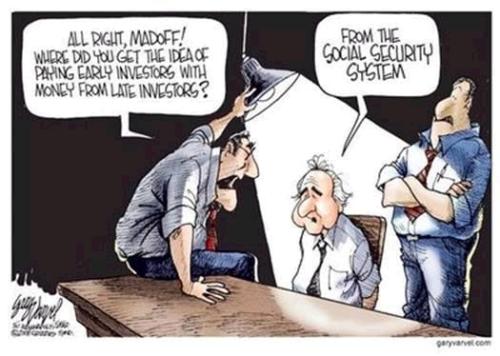By Rich Kozlovich
Editor's Note: I originally published this on Friday, June 26, 2015, but with current events I've decided to publish this again. And I've decided to run this at least once a year.
Editor's Note: I originally published this on Friday, June 26, 2015, but with current events I've decided to publish this again. And I've decided to run this at least once a year.
Yesterday Mark J. Fitzgibbons penned this article, Sotomayor's 4th Amendment Time Bomb regarding “A painfully slim 5 – 4 ruling this week by the Supreme Court in City of Los Angeles v. Patel”. He writes, “The court struck down a Los Angeles ordinance that allowed police officers to inspect hotel guest registries for any or even no reason, and without a warrant. The ruling that the Fourth Amendment applies to businesses and that statutes may be declared unconstitutional on their face is consistent with principles as old as, and even older than, the Constitution.” But he also notes that “Justice Sonya Sotomayor’s majority opinion is also a blueprint for a major power grab for the administrative police state” because “her majority opinion even seems to suggest that police departments may be given power to approve their own searches using administrative subpoenas instead of going to judges to obtain warrants”.
Administrative subpoenas? Is she serious? This isn’t something that should even be an option! The article goes on to explain why say it’s Constitutionally inappropriate for administrative subpoenas to be issued by federal bureaucrats saying, “Justice Frank Murphy’s short but powerful and prescient dissent from his all-Democrat appointed colleagues is spot on”:
Administrative subpoenas? Is she serious? This isn’t something that should even be an option! The article goes on to explain why say it’s Constitutionally inappropriate for administrative subpoenas to be issued by federal bureaucrats saying, “Justice Frank Murphy’s short but powerful and prescient dissent from his all-Democrat appointed colleagues is spot on”:
"I am unable to approve the use of nonjudicial subpoenas issued by administrative agents. Administrative law has increased greatly in the past few years, and seems destined to be augmented even further in the future. But attending this growth should be a new and broader sense of responsibility on the part of administrative agencies and officials.
Excessive use or abuse of authority can not only destroy man's instinct for liberty, but will eventually undo the administrative processes themselves. Our history is not without a precedent of a successful revolt against a ruler who "sent hither swarms of officers to harass our people."
Perhaps we are too far removed from the experiences of the past to appreciate fully the consequences that may result from an irresponsible though well meaning use of the subpoena power.
To allow a nonjudicial officer, unarmed with judicial process, to demand the books and papers of an individual is an open invitation to abuse of that power. It is no answer that the individual may refuse to produce the material demanded. Many persons have yielded solely because of the air of authority with which the demand is made, a demand that cannot be enforced without subsequent judicial aid. Many invasions of private rights thus occur without the restraining hand of the judiciary ever intervening.
Only by confining the subpoena power exclusively to the judiciary can there be any insurance against this corrosion of liberty. Statutory enforcement would not thereby be made impossible. Indeed, it would be made easier. A people's desire to cooperate with the enforcement of a statute is in direct proportion to the respect for individual rights shown in the enforcement process.
Liberty is too priceless to be forfeited through the zeal of an administrative agent."
Does Sotomayor, who actually described herself as the “wise Latina”, really understand that?
The founding fathers created lifetime appointments for federal judges because they wanted them to be unafraid about losing their jobs for unpopular decisions. There were some differences between then and now. First of all there were few federal judges and nowhere in the Constitution does it outline exactly their duties. Originally the Supreme Court handled very common cases. Their authority developed over time and they pretty much created their own parameters of responsibility.
Secondly the federal government was amazingly small compared to today and everyone pretty much thought it would stay that way. However the passage of the 16th amendment (income tax) and 17th Amendment (popular elections of Senators) pretty much laid the foundation destroying the checks and balances between the branches of government and the vision of a limited central government, which the founding fathers believed was essential to individual liberty. They couldn't have been more right.
Although it’s true judges can be removed by impeachment. It’s also true the federal judiciary is filled with political hacks that have made decisions that can’t be construed as anything but high crimes. The high crimes of the Constitution means a “crime of high office”,which can simply mean they’ve failed to perform the duties they have sworn by oath to perform. It’s clear the federal judiciary no longer believe they have to "solemnly swear (or affirm)they will administer justice……under the Constitution and laws of the United States." They’re clearly not following the Constitution, and they clearly don’t believe they need to “preserve and defend the Constitution against all enemies foreign and domestic” since they are Constitution’s greatest enemy. If that’s so – and it is – and it’s so obvious – and it is – why aren’t more judges impeached? Because getting a two thirds majority to vote for conviction from the Senate is almost impossible.
As historian Dr. Clarence Carson wrote: "Jefferson doubted that the fear of impeachment was little more than a paper tiger, or as he put it frequently in private correspondence, “not even a scarecrow.” He put the danger this way: “We already see the power, installed for life, advancing with a noiseless and steady pace to the great object of consolidation. [“The engine of consolidation,” he had said, “will be the federal judiciary . . . .”] The foundations are already deeply laid by their decisions for the annihilation of constitutional state rights, and the removal of every check, every counterpoise to the engulfing power of which themselves are to make a sovereign part.”
Has this occurred? It should be obvious to the most casual observer that it has and the Supreme Court’s recent decision King v. Burwell is a clear example the federal judiciary has become an out of control law unto themselves. Justice Scalia’s scathing dissent is a simple, direct and easy to understand intellectual tour-de-force demonstrating how far they’ve sunk in their efforts to overturn the balance of power created by the Constitution.
Scalia states: “We should start calling this law SCOTUScare ……the cases will publish forever the discouraging truth that the Supreme Court of the United States favors some laws over others, and is prepared to do whatever it takes to uphold and assist its favorites…
He went on to say: “Words no longer have meaning …..Under all the usual rules of interpretation, in short, the Government should lose this case. But normal rules of interpretation seem always to yield to the overriding principle of the present Court: The Affordable Care Act must be saved……
He observes: The Court tries to palm off the pertinent statutory phrase as “inartful drafting.’ This Court, however, has no free-floating power ‘to rescue Congress from its drafting errors.’”…..“The Court’s decision reflects the philosophy that judges should endure whatever interpretive distortions it takes in order to correct a supposed flaw in the statutory machinery. That philosophy ignores the American people’s decision to give Congress ‘[a]ll legislative Powers’ enumerated in the Constitution. They made Congress, not this Court, responsible for both making laws and mending them.”…..
Demonstrating just how dangerous the federal judiciary has become: “More importantly, the Court forgets that ours is a government of laws and not of men. That means we are governed by the terms of our laws, not by the unenacted will of our lawmakers. ‘If Congress enacted into law something different from what it intended, then it should amend the statute to conform to its intent.’ In the meantime, this Court ‘has no roving license … to disregard clear language simply on the view that … Congress ‘must have intended’something broader.”…
He states what should be the understanding of all federal jurists: “Rather than rewriting the law under the pretense of interpreting it, the Court should have left it to Congress to decide what to do about the Act’s limitation of tax credits to state Exchanges.”
If the Constitution is going to really be the document that governs government, and is the real and legitimate law of the land, it's in serious need of reinforcements. It’s time for a 28th Amendment that would impose strict term and age limits on the federal judiciary.
There are three levels of the federal judiciary- the District level, the Appeals level and the Supreme Court. Each level should have a ten year limit with a review after five years requiring a majority approval by the Senate. At each level each nominee would have to go through the same process, even if nominated to a higher court before they finish their term in a lower court. If their tem runs out and they’re not nominated to a higher court they may be nominated at some point in the future. No jurist can return to a lower court if their term runs its course at a higher level, and no jurist can ever be appointed to a court if their nomination to any court has ever been rejected by the Senate. No jurist may serve after the age of seventy.
Here’s the fix! Abolish the FED, repealing the 16th and 17th Amendments and pass a 28th amendment. Everything else will fall into place.
Here’s the fix! Abolish the FED, repealing the 16th and 17th Amendments and pass a 28th amendment. Everything else will fall into place.
Oh, one more thing.









